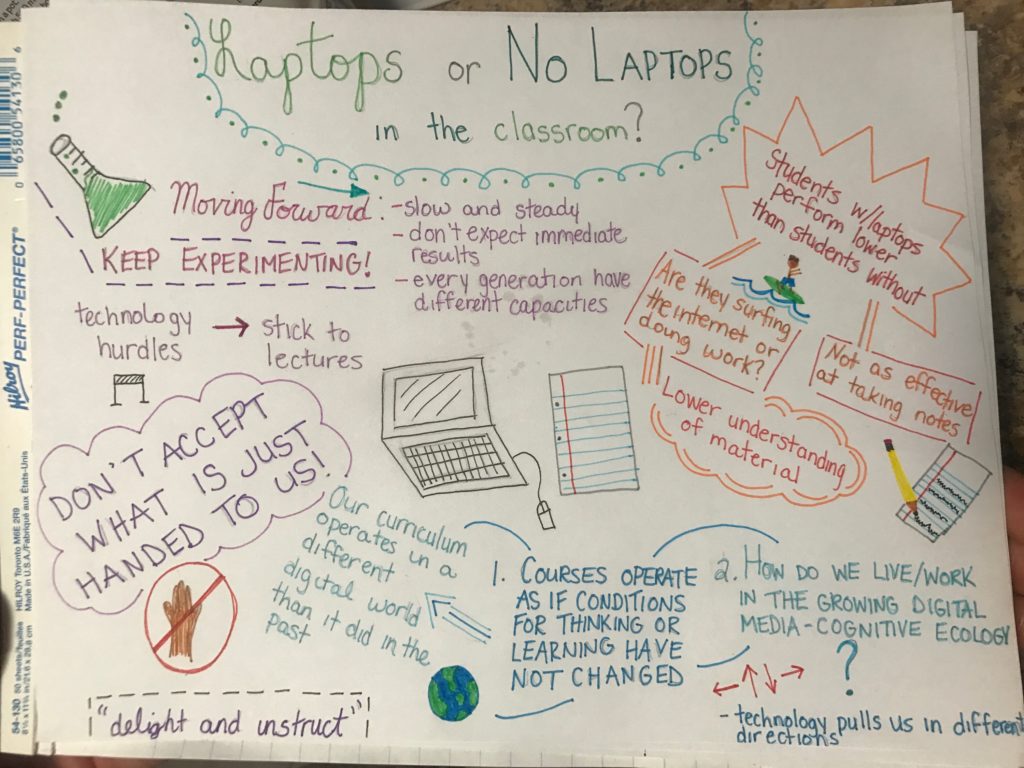In the article “Laptops, Classrooms, and Matters of Electrate Concern” A. Reid discusses technology use in the classroom. A study by Susan Payne Carter, Kyle Greenberg, and Michael Walker has recently shown that students who use laptops in classrooms do not perform as well as students without laptops. The author thinks that there could be possible reasons for this. Firstly, he states that students who use their computers during class could be doing other things such as surfing the internet or messaging friends, drawing their attention away from class. Second, using computers to take notes is less effective than using a pen and paper. Another possible explanation could be that professors could be interacting differently to those who do use computers. The author thinks that both teachers and students have not yet figured out hot to learn and work in this media-cognitive ecology because technology is often pulling us in different directions. He also thinks that in our courses we go on as if the conditions for learning have not changed over the years. He suggests that as a faculty we rethink or curriculum and the way we teach since it operates in a different way than before. What we do know is very limited. We should not just accept what is handed to us, both with digital and non digital practices. It is easy to just stick to lectures and exams instead of venturing out to what we are not familiar with. In the future we need to start experimenting more. Change is not going to occur immediately, but come about slowly. It is important that we create new learning environments that go hand in hand with the curriculum.
Technology in the classroom definitely has its pros and cons. I agree with the beginning of this article and Reid’s reasons why students who use laptops may have lower scores. I reacted to this article so strongly because in my undergrad I used my laptop for almost every class and very easily got distracted on it. I was the student surfing the internet and messaging my friends. Most of my classes were taught in French so I very easily got distracted and zoned out, and this was reflected in some of my marks. I also found it easier to memorize notes and take in information when I was writing it instead of typing it. It was so much easier to write because there are so many accents in French and I would constantly have to add them in if I was typing. This does not mean that technology shouldn’t be allowed in the classroom. Technology in the classroom can be very distracting but I do think it should be allowed. In my opinion technology can help with learning as well. To me, technology should not be the main part of the lesson, but should be there to enhance learning. The teacher should still teach part of the lesson using non digital tools, this way students are paying attention and aren’t distracted, but can later use the technology to further help students grasp the key parts of the lesson. In my placements I often used videos on the iPads to help my students understand the lesson. I always taught the lesson first and then used the technology in small parts throughout the main lesson. In today’s times where technology is becoming bigger and bigger, it is important to incorporate it into the students’ learning. Before reading this post I thought that technology was a valuable asset in the classroom. I still think this but have gained some new information on the topic. The most important thing that I received from this article is that we need to keep experimenting with technology. Changes won’t be made if we don’t try. It will be a slow change but we will see the change occur. Moving forward I am going to try new programs and apps that I could incorporate into my lessons. I think it is important for teacher’s to share as well. Share what you have found, what works and what doesn’t. We are all in this together!
I decided to create a Sketchnote of the article that I read. Here (Laptops or No Laptops) is a pdf version with a bigger version of the image.

